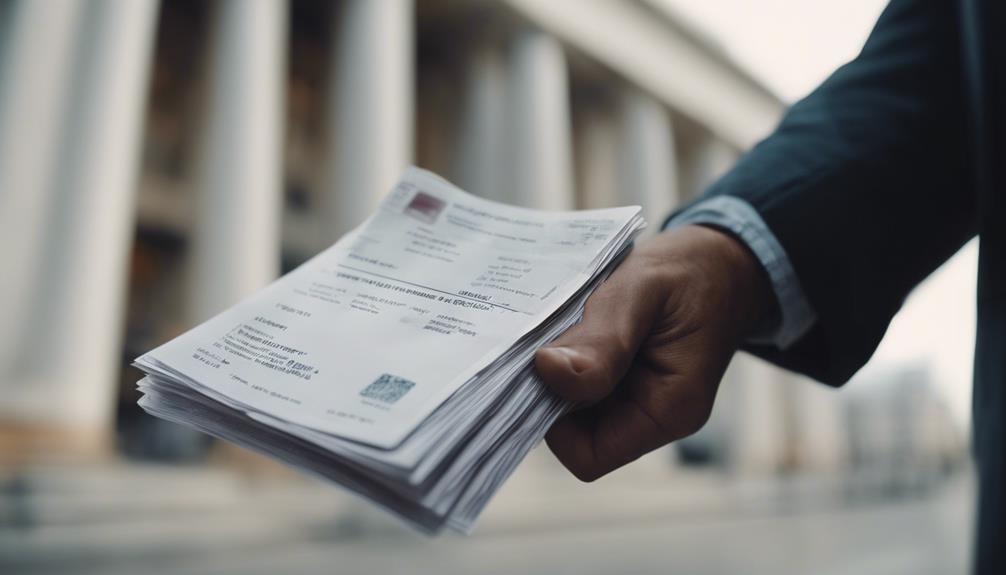Navigating the intricate path of opening a US business account as a foreigner is akin to embarking on a challenging voyage through uncharted waters. The journey may seem daunting, with regulations and requirements looming ahead.
However, by understanding the nuances of the process, equipping yourself with the right tools, and seeking expert guidance, you can steer your course towards success in establishing your business presence in the US. The key lies in perseverance and strategic planning, ensuring that your efforts yield fruitful outcomes in the vast American market.
Key Takeaways
- Choose a US bank experienced with non-resident accounts.
- Be meticulous with required documentation and forms.
- Understand and comply with US banking regulations.
- Overcome communication barriers with clear and culturally sensitive interactions.
Challenges for Non-Residents Opening US Business Account
Opening a US business account as a foreigner presents numerous challenges that can hinder your progress and require careful navigation. US banks have stringent checks and regulations in place, especially for non-residents, making the process complex.
Some banks, like US Bank, Chase, and Wells Fargo, are more open to non-residents, but others have limited risk tolerance. Dealing with misinformation from bank employees can lead to account rejections, adding to the difficulties.
One common hurdle is the requirement of having a US phone number, which can be challenging for foreigners. Additionally, managing mail requirements can also be a roadblock for non-residents trying to open US business accounts.
These challenges highlight the importance of being well-prepared and informed when navigating the process of establishing a business account in the US as a foreigner. By understanding the specific requirements and potential obstacles, you can increase your chances of successfully opening a US business account.
Document Requirements for Foreign Applicants
Navigating the process of establishing a US business account as a foreign applicant requires meticulous attention to specific document requirements. As a foreign applicant, you must be prepared to provide two forms of government-issued identification for all business owners and directors when opening a US business bank account. Additionally, you'll need to present an Employer Identification Number (EIN) and Articles of Organization.
It's essential to state the reason for opening a business account in the US as part of the documentation process. Specific forms tailored to your foreign corporate entity type must also be submitted during the account opening process. Keep in mind that some US banks may request a minimum deposit amount from foreign applicants.
Understanding US Banking Regulations
Understanding US banking regulations is essential for non-residents looking to successfully open a business account in the US. The framework of US banking regulations is rooted in federal laws such as the Bank Secrecy Act and the Patriot Act. These laws mandate that banks verify customer identities, monitor transactions for suspicious activities, and report any irregularities.
For non-residents, compliance with Know Your Customer (KYC) and Anti-Money Laundering (AML) regulations is obligatory when opening a US bank account. These regulations exist to combat money laundering, terrorist financing, and various financial crimes that could jeopardize the integrity of the financial system.
Choosing the Right US Bank
To ensure a smooth and successful process when opening a US business account as a foreigner, selecting the right US bank is crucial for your venture's financial needs and growth potential. When choosing a US bank, consider the following:
- Reputation: Look for well-established banks like JP Morgan Chase, Bank of America, Citibank, or Wells Fargo known for their reliability and stability in the financial industry.
- Accessibility: Opt for a bank with a wide network of branches across the US, such as Bank of America with its 4,861 branches, to make managing your account more convenient, especially as a foreign entrepreneur.
- Services: Prioritize banks like Citibank, which not only have a significant presence in the US but also offer comprehensive business banking services tailored to non-resident account holders like yourself.
Choosing a US bank with a solid reputation, accessibility, and specialized services for non-resident account holders will set a strong foundation for your business operations in the United States.
Addressing Verification and Identification Hurdles

Overcoming the challenges of verification and identification is a critical step for non-residents looking to open a US business account successfully. As foreign business owners, you may encounter requirements to provide two forms of government-issued identification. This can include your passport and another official document to prove your identity.
However, the hurdle of providing proof of address in the US can be more complicated, especially if you don't have a physical presence in the country. US banks may also request additional verification documents to ensure compliance with regulations, adding to the opening hurdles you face.
It's crucial to gather all necessary identification requirements and verification documents to streamline the process of opening your non-resident business account. By ensuring you have all the required paperwork and meeting the identification criteria, you can navigate through these hurdles and successfully establish your US business account as a foreign entrepreneur.
Overcoming Language and Communication Barriers
When you encounter language barriers while opening a US business account, consider utilizing translation tools or hiring bilingual staff to facilitate communication effectively.
Clear and concise communication is crucial to ensure you understand all the terms, requirements, and procedures involved in the account opening process.
Incorporating non-verbal cues and gestures can also aid in conveying information accurately, complementing your verbal exchanges.
Language Translation Tools
Using language translation tools like Google Translate can significantly enhance your ability to effectively communicate during the process of opening a US business account as a foreigner. These tools offer real-time translations, bridging the language gap between non-English speakers and bank representatives. Here are some key benefits of using language translation tools:
- Translate documents, emails, and conversations instantly.
- Assist in understanding and responding to banking requirements.
- Ensure clear communication, reducing misunderstandings during the account opening process.
Cultural Communication Sensitivity
Enhancing your cultural communication sensitivity is essential when navigating language and communication barriers while opening a US business account as a foreigner. Understanding cultural nuances and adapting communication strategies to align with American business practices are key.
Language barriers can be overcome through the use of professional interpreters who facilitate effective communication during the account opening process. Pay attention to non-verbal cues such as body language and gestures, as they play a significant role in cross-cultural interactions.
Navigating Tax Implications for Non-Residents

When opening a US business account as a non-resident, understanding tax implications is crucial.
You need to consider factors such as tax residency determination, your obligations as a non-resident, and potential benefits under tax treaties.
Seeking guidance from a tax professional can help you navigate these complex tax requirements effectively.
Tax Residency Determination
Navigating tax implications as a non-resident in the US involves understanding the Substantial Presence Test for tax residency determination over a three-year period. To better comprehend your tax obligations, consider the following key points:
- Substantial Presence Test: Counts days spent in the US over a three-year period.
- Closer Connection Exception: Allows maintaining tax residency in your home country if ties there are stronger.
- Form 8840: File this to establish closer ties to a foreign country for tax purposes.
Understanding these concepts is vital for non-residents aiming to open US business accounts, ensuring compliance with tax regulations and steering clear of potential penalties. Stay informed to navigate the complexities of tax residency determination successfully.
Non-Resident Tax Obligations
To successfully navigate the tax implications as a non-resident with a US business account, understanding and fulfilling your tax obligations to the IRS is essential. As a non-resident, you must report your income and pay taxes promptly. It's crucial to comprehend the complexities of tax treaties to prevent double taxation between your home country and the US.
Factors like Permanent Establishment rules, tax residency status, and withholding tax rates need careful consideration. Stay vigilant about tax deadlines, forms such as W-8BEN, and potential tax credits or deductions you might be eligible for. Ensuring compliance is vital, as failing to meet US tax obligations can result in penalties and legal repercussions.
Proper tax planning is key to navigating these responsibilities successfully.
Tax Treaty Benefits
To optimize your tax obligations and maximize returns on your US business operations as a non-resident, harnessing the benefits provided by tax treaties between the US and other countries is crucial. Understanding tax treaty benefits can significantly impact your financial outcomes.
- Reduce Withholding Tax Rates: Utilize tax treaties to claim reduced withholding tax rates on income earned in the US.
- Eligibility Requirements: Familiarize yourself with the specific conditions and requirements outlined in tax treaties to ensure you qualify for the benefits.
- Maximize Returns: By leveraging tax treaty benefits, you can effectively manage your tax liabilities and enhance the profitability of your US business ventures.
Dealing With Residency Proof Challenges

When faced with challenges proving your residency for opening a US business account as a foreigner, consider leveraging specialized services like ACME Filings to meet the required bank criteria. One common hurdle for non-residents is providing a US postal address, which is often a requirement by some US banks. Lack of a US postal address can result in rejections when applying for a business bank account. To overcome residency proof challenges, it is essential to seek assistance from specialized agencies or explore alternative methods to fulfill the bank requirements.
| Challenges | Solutions |
|---|---|
| Lack of US postal address | Utilize services like ACME Filings to obtain a US address. |
| Rejections due to residency proof | Seek guidance from specialized agencies familiar with bank requirements. |
| Difficulty meeting bank criteria | Explore alternative methods such as virtual offices or mail forwarding services. |
| Limited options for non-residents | Consider partnering with a local entity to meet residency requirements. |
| Importance of accurate documentation | Ensure all paperwork is in order and meets the bank's standards. |
Establishing a Strong Business Presence in the US
Establishing a robust business presence in the US demands proactive steps such as registering a US company and securing an Employer Identification Number (EIN). To solidify your presence and credibility, consider the following:
- Physical US Presence: Having a physical presence through a virtual office or registered agent can enhance trust and legitimacy in the eyes of US partners and clients.
- Building Relationships: Strengthen your foothold by cultivating relationships with US-based partners, suppliers, or clients. These connections can help propel your business forward.
- Engaging in US Events: Participation in US trade shows, events, or industry conferences is key to raising awareness about your brand and establishing valuable connections within the American market.
Frequently Asked Questions
Can a Foreigner Open a Business Bank Account in Usa?
Yes, you can open a business bank account in the USA as a foreigner. Legal requirements include having a US registered company. Documentation needed: official ID, secondary ID, and a US postal address. Consider Fidelity for advantageous banking options.
Which US Banks Will Let Foreigners Open an LLC Account Online?
Looking to establish your business in the US as a foreign entrepreneur? Several US banks like Silicon Valley Bank, First Republic Bank, Radius Bank, and Mercury offer online options for opening LLC accounts, catering to international requirements with digital processes and remote access.
What Is the Best US BUSiness Bank Account for Non Residents?
When opening a US business account as a non-resident, consider Fidelity. Their international options, online applications, and expertise in handling accounts for foreign companies make them a top choice. No annual fees, great service, and investment opportunities await.
Can a Non US Citizen Open a Chase BUSiness Account?
Yes, as a non-US citizen, you can open a Chase business account. Visit a branch with your ITIN or SSN, business registration proof, and required documents. Chase may scrutinize additional criteria. Inquire directly with the bank for details.
Conclusion
You've faced the challenges head-on, tackled the hurdles with determination, and now you're on the brink of establishing your business presence in the US.
The journey may have been tough, but the rewards that await you're worth every obstacle you've overcome. Keep pushing forward, keep striving for success, and soon enough, you'll see your dreams become a reality.
Embrace the journey, embrace the possibilities, and watch your business thrive in the land of opportunity.